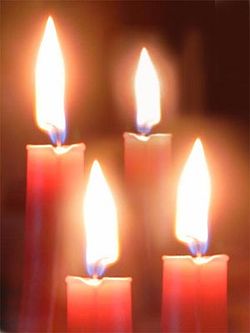The Rev. Constantine Newman
 |
This period in both East and West reminds us that all the feasts of the church have a constant rhythm of anticipation and fulfillment. No feast is possible without the preceding anticipation. This rhythm reflects the natural human desire to experience a buildup of expectation, which then, in turn, increases the joy of the celebration.
We see the denial of this natural rhythm increasingly more frequently in our society. Instead of quiet preparation of prayer and fasting, we engage in a whirlwind of activities. Our schedules are filled with Christmas concerts and Christmas parties. People even began decorating for Christmas the day after Halloween.
We become so sated with this busyness because it is not truly filling (or fulfilling), but is more like empty calories: It fills us up because of its bulk, but it is not truly nutritious. Sadly, we see the result: On Dec. 26, the beginning of the 12-day Christmas celebration, Christmas trees are already lying on the curb waiting for trash pickup.
The Orthodox observance can serve as an illustration of this important rhythm of anticipation and fulfillment. The 40 days before Christmas make up a fasting season; although many of the faithful do not observe the fast strictly, it still reminds us of the need for spiritual preparation. The outward preparations — decorating the house, buying presents, making cookies and other goodies — should all have the spirit of anticipating the celebration of the Incarnation.
Although the fast actually begins on Nov. 15, the liturgical preparation begins on Nov. 21 with the Feast of the Entrance of the Mother of God into the Temple. This feast celebrates the theological truth that the dwelling place of God was no longer a building of stone, but the human being. On Nov. 21, we begin singing a special set of hymns in Morning Prayer that begin: "Christ is born: glorify Him! Christ has come down from heaven: receive Him! Christ is now on earth: exalt Him! O you earth, sing to the Lord! O you nations, praise Him in joy, for He is gloriously triumphant!" Like a masterful symphony, the first strains of the theme can be heard, introduced subtly at first, but gradually building in intensity to the cosmic conclusion.
Other hymns are gradually added to the daily celebrations of the saints, which also begin to direct our minds toward Christmas. This is a good example: "Isaiah, dance for joy: receive the word of God. Prophesy to the Virgin Mary that the bush burning with fire will not be consumed by the radiance of our God. Let Bethlehem be prepared! Let the gates of Eden be opened! Let the Magi come forth to see wrapped in swaddling clothes in a manger of beasts the salvation which the star has pointed out from above the cave: the life-giving Lord who saves humanity!"
The preparatory season for Christmas is an important part of our human rhythm. The joy of Christmas will be all that much greater if we allow ourselves to enjoy the tension of the anticipation.
• • •
The Rev. Constantine Newman is pastor of the Annunciation Greek Orthodox Church in Newburyport, MA.
10 / 12 / 2010
Комментариев нет:
Отправить комментарий